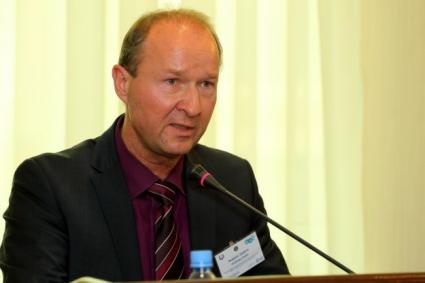A strict enforcement of legal decisions facilitated by the creation of a liberal judicial officer
The Union of judges of Kazakhstan organizes every four years its national congress. 650 judges coming from the fourteen regions of the 9th larger country in the world met in the Palace of the Independence of Astana, the ultramodern and dynamic new capital created in 1997, to discuss the topic of the prospects for improvement of the legal system of the Republic of Kazakhstan.
The congress, organized by Ayeznur Khazhenov, President of the Union of judges of Kazakhstan, was chaired by Musabek Alimbekov, President of the Supreme Court. The UIHJ was represented by its first secretary, Mathieu Chardon. The International Association of Judges was represented by its President, Jose Maria Bento Company. The President of the Supreme Court of the Russian Federation was also in the hemicycle, as well as representatives of Azerbaijan, Georgia, Kirghizstan and Uzbekistan. Nursultan Nazarbaev, President of the Republic of Kazakhstan, personally honored with his presence this main event relayed all over the country by the media.
In his opening speech, Mr. Nazarbaev thanked the participants for their presence as well as the international delegations to whom he wished a pleasant stay in his country. The President of the Republic insisted on the importance of the independence of judges, indicating that this objective, ensured by the constitution, was a reality in his country. He declared that the quality of justice has strongly increased since the past years due to the great efforts developed, but that it was still necessary, initially, to improve the working conditions of judges and then to increase their number. For him, one of the future challenges is the modernization of the judiciary. Among the top priorities is the improvement of the trust of citizens towards the justice system. Selective criteria and high training for judges should gradually be increased, including the simplification of procedures taking into account aspects of alternative modes of conflict resolution such as conciliation and mediation, or E-justice. In the same direction, Mr. Nazarbaev declared his personal concern that Kazakh law meet international standards. The President of the Republic expressed himself very clearly on the topic of enforcement of legal decisions. According to him “the strict enforcement of legal decisions will be facilitated by the installation of a system of liberal judicial officers”. Mr. Nazarbaev thus gave his personal support for the bill which is currently at Parliament and which should be adopted at the beginning of January 2010. This is obviously very good news.
Mr. Alimbekov indicated that many jurisdictions were created since 1991, date of independence of Kazakhstan: juvenile courts, administrative jurisdictions, bankruptcy or military courts, etc. The president of the Supreme Court ardently supports the projects of modernization of the legal system. The use of new technologies, E-justice, audio and video within the framework of lawsuits, must contribute to a change in mentalities to reinforce trust in the Kazakh legal system and to allow a reduction of bureaucracy as well as a simplification of legal proceedings, in the strict respect of human rights and international standards.
It is necessary to acknowledge the perfect organization of this congress and to underline how much Kazakhstan appears as a modern and open country in the field of justice, on top of an exceptional sense of hospitality.
A great conference for 2010
The following day, Mathieu Chardon was invited to meet the representatives of the Committee of Legal Administration (CLA) of the Supreme Court of Kazakhstan, currently chaired by Georgiy Kim. The first secretary of the UIHJ discussed with Bakhtiyar Unerbaev, vice-president of the Committee, Iraq Yelekeev, former president of the Committee and newly appointed as Deputy of the Majilis of Kazakhstan (Lower House of the Parliament), Bolat Zhulaminov, member of the Committee and co-author of the law on private judicial officers, and Aidos Imanbaev, in charge of International affairs at the Committee. The CLA, located in the right wing of the Supreme Court, employs sixty people. It has two main functions: the material organization of all that touches this jurisdiction and other jurisdictions of the country, and the supervision of the work of enforcement agents.
The meeting was held in the presence of all the staff of the CLA. Iraq Yelekeev, in his capacity as Deputy and former President of the CLA, thanked the UIHJ for its total support in the reforms undertaken by Kazakhstan to create a body of liberal judicial officer. The Kazakh deputy - elected “Man of the Year in 2008” by our organization (see our article on our site) - stated that his current function as Member of Parliament enables him to present the bill, to defend it and to ensure its promotion. The bill should be voted in January 2010 and the new law should be operational in the second half of the year. “I will be always at your sides” announced Mr. Yelekeev to the First Secretary of the UIHJ, by affirming his attachment to the occupation of liberal judicial officer of which he declared himself ready to become president of the chamber to be created, “in order to pursue the work that was initiated”.
In spring 2010, the CLA should organize an international seminar in Kazakhstan. Its objective would be double: presentation of the new law to the public, and invitation to the Community of Independent States (CIS) countries to give a progress report on their current reforms and to present them with the model of the liberal judicial officer. “Many investors declare themselves very interested by a liberal judicial officer for the States of the CIS” said Mr. Yelekeev.
The CLA required the support and the assistance of the UIHJ to organize this international seminar which would include the participation of European countries where the occupation of liberal judicial officer is already in place. Appointment is thus taken in 2010 for this great conference which could be the cornerstone of the development of the occupation of judicial officer in Central Asia.


